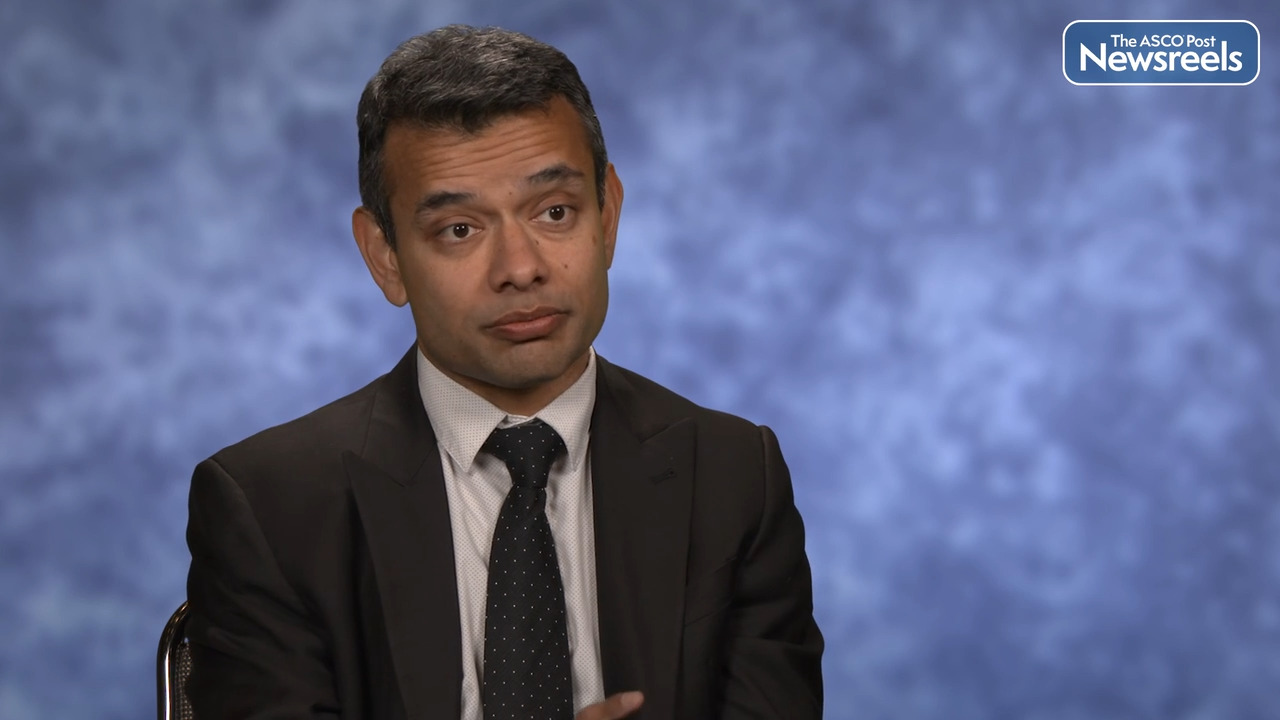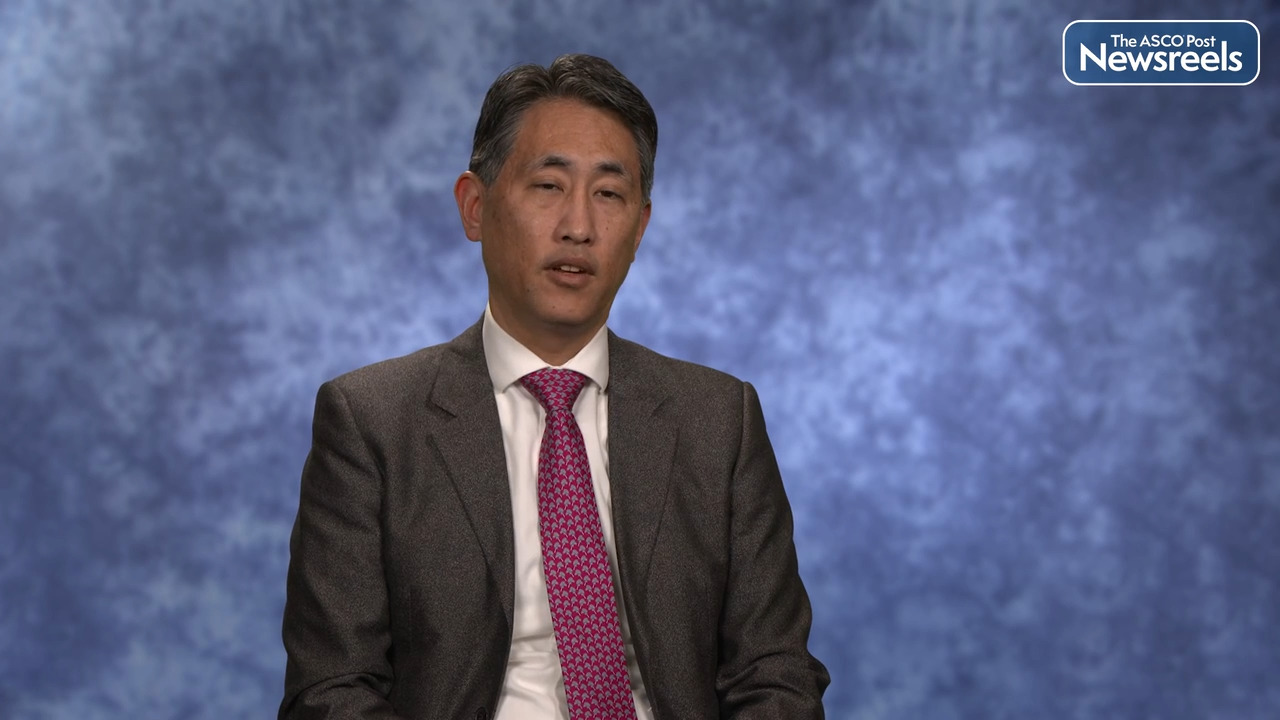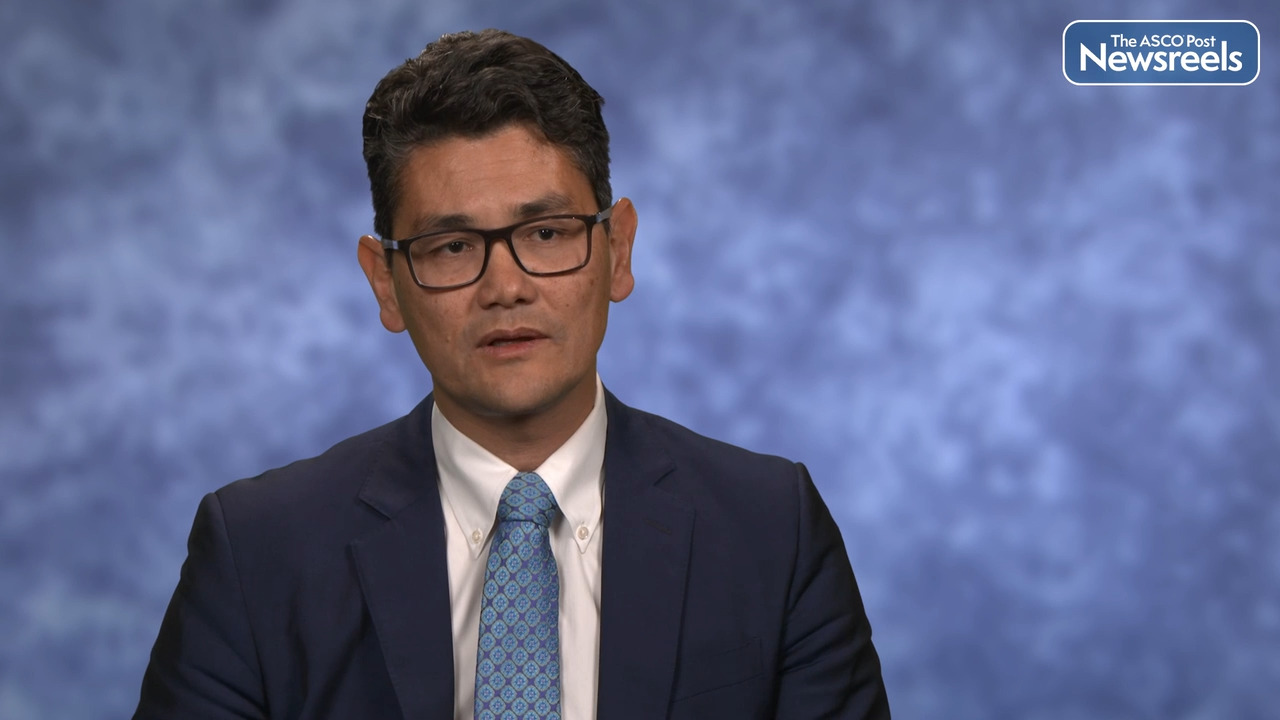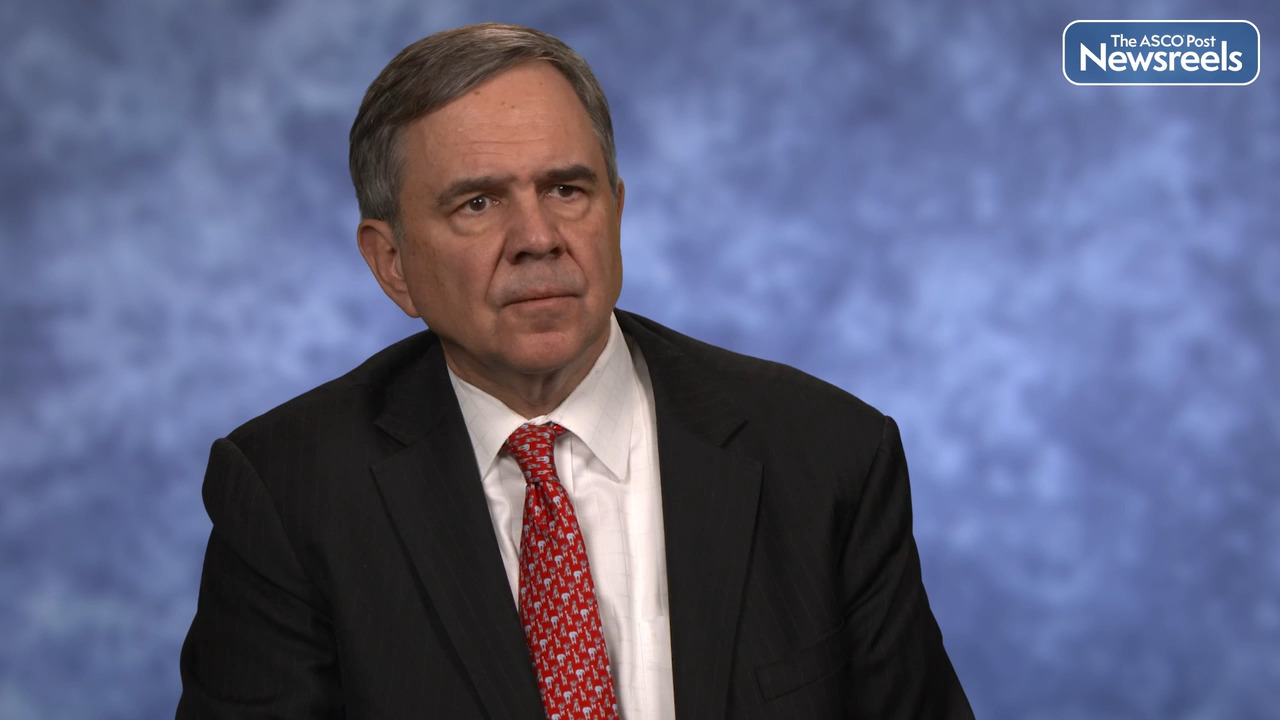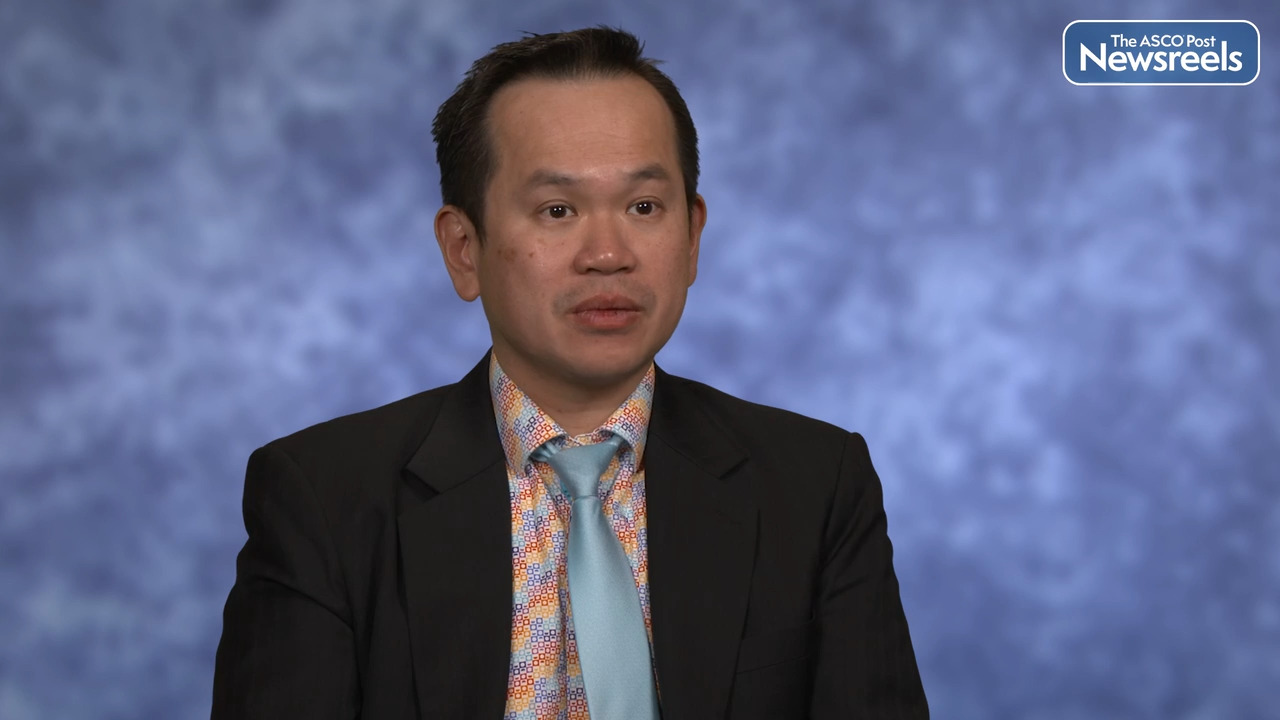First-Line Systemic Treatments in Metastatic Castration-Sensitive Prostate Cancer
In a systematic review and meta-analysis reported in JAMA Oncology, Riaz et al found that first-line triplet therapy in metastatic castration-sensitive prostate cancer did not appear to offer an overall survival advantage vs androgen pathway inhibitor doublet therapy. As stated by the...
Rucaparib vs Physician’s Choice of Single-Agent Therapy in BRCA-Mutated Metastatic Castration-Resistant Prostate Cancer
As reported in The New England Journal of Medicine by Karim Fizazi, MD, PhD, of Gustave Roussy Institute, Paris-Saclay University, and colleagues, the phase III TRITON3 trial has shown significantly improved progression-free survival with rucaparib vs physician-selected single-agent therapy in the...
Expert Point of View: Tyler Seibert, MD, PhD
Formal discussant of the FORMULA-509 trial, Tyler Seibert, MD, PhD, of the University of California San Diego, commented: “The important take-away of these results is who benefited from the intensification arm. The overall cohort with a PSA [prostate-specific antigen] level up to 0.5 ng/mL did not, ...
FORMULA-509: Intensified Postoperative Regimen May Be of Benefit in Subset of High-Risk Prostate Cancer
The addition of abiraterone acetate and apalutamide to standard of care gonadotropin-releasing hormone (GnRH) agonist for 6 months and radiation therapy failed to improve progression-free survival and metastasis-free survival after prostatectomy compared to bicalutamide plus a GnRH agonist and...
Expert Point of View: Elena Castro, MD, PhD
The formal discussant of the TALAPRO-2 trial, Elena Castro, MD, PhD, took issue with the conclusion of Dr. Neeraj Agarwal and colleagues that these results support the use of talazoparib plus enzalutamide as a first-line treatment of patients with metastatic castration-resistant prostate cancer,...
TALAPRO-2: Talazoparib Plus Enzalutamide Extends Radiographic Progression–Free Survival in Metastatic Castration-Resistant Prostate Cancer
The addition of the poly (ADP ribose) polymerase (PARP) inhibitor talazoparib to the androgen receptor signaling inhibitor enzalutamide achieved a statistically significant and clinically meaningful improvement in radiographic progression–free survival compared with placebo plus enzalutamide as...
Alex K. Bryant, MD, on PSA Screening and Metastatic Prostate Cancer in the VA Health-Care System
Alex K. Bryant, MD, of the University of Michigan, examined Veterans Administration (VA) facilities in which lower prostate-specific antigen (PSA) screening rates were associated with a subsequent increased incidence of metastatic prostate cancer, particularly among men aged 70 and older. From 2008 to 2019, PSA screening rates have declined in the national VA system, data that may be used to inform shared decision-making about the potential benefits of screening for those who wish to reduce their risk of advanced prostate cancer. (Abstract 298).
Rahul Aggarwal, MD, on Prostate Cancer: Phase III Data on Apalutamide and Androgen Deprivation in Relapsed Disease
Rahul Aggarwal, MD, of the University of California, San Francisco, discusses recent data from the PRESTO study, which showed that apalutamide plus androgen-deprivation therapy (ADT) for 12 months significantly prolonged PSA progression-free survival compared with ADT alone in patients with biochemically recurrent prostate cancer. These results provide support for the intensification of ADT in this setting. (Abstract LBA63).
Darolutamide Plus Androgen-Deprivation Therapy and Docetaxel in Metastatic Hormone-Sensitive Prostate Cancer
The addition of the androgen receptor inhibitor darolutamide to androgen-deprivation therapy and docetaxel reduced the risk of death by 30% compared with androgen-deprivation therapy plus docetaxel in patients with metastatic hormone-sensitive prostate cancer, according to a post hoc analysis of...
Active Monitoring, Surgery, or Radiotherapy for Localized Prostate Cancer: 15-Year Outcomes in the UK ProtecT Trial
As reported in The New England Journal of Medicine by Freddie C. Hamdy, FRCS(Urol), FMedSci, and colleagues, 15-year follow-up of the UK phase III ProtecT trial has shown no significant difference in prostate cancer mortality with active monitoring, surgery, or radiotherapy for patients with...
Racial Inequalities in Prostate Cancer Care May Be Associated With Facility-Level Disparities
Racial minorities in the United States may be less likely to receive treatment for prostate cancer and, overall, have worse survival outcomes compared with individuals who are White, according to a new study published by Nguyen et al in Urologic Oncology. Typically, patient-level and...
New Research Highlights the Negative Impact of Continued Exclusion of Patients With African Ancestry From Research on Cancer Genomics
Researchers have revealed how the lack of genomic research for individuals with African ancestry—particularly those from the Sub-Saharan region—may be hampering efforts to reduce disparities for patients with prostate cancer, according to a new study published by Gheybi et al in JNCCN–Journal of...
Delaying Treatment for Patients With Localized Prostate Cancer May Not Increase Mortality Risk, ProtecT Trial Shows
Patients with prostate cancer who undergo active monitoring may experience the same 15-year survival rates as those who undergo radiotherapy or surgery, according to new findings published by Hamdy et al in The New England Journal of Medicine and simultaneously presented at the 2023 European...
New Technique May Reduce Postoperative Complications in Prostate Cancer Surgery
Researchers have found that a novel technique used during prostate cancer surgery may reduce the risk of postoperative lymphocele by 50%, according to new findings presented by Neuberger et al at the 2023 European Association of Urology Annual Congress (Abstract A0656). The technique—involving the...
Digital Rectal Examination Fails to Detect Early Prostate Cancer, Study Shows
A common method of detecting prostate cancer may not be accurate enough to serve as a reliable screening tool by itself, researchers have warned. The digital rectal exam (DRE), in which health-care providers check the prostate gland with a finger for unusual swelling or lumps in the rectum, is...
PSMA-PET/CT May Help Improve Clinical Treatment of Prostate Cancer
A trial conducted at the University Hospital Bonn, Germany, has been testing the benefit of PSMA-PET/CT (prostate-specific membrane antigen–positron-emission tomography/computed tomography) to help target where to take biopsy samples, potentially improving the diagnosis of prostate cancer by giving ...
Trends in Active Surveillance for Management of Low-Risk Prostate Cancer in the United States
In an analysis reported in JAMA Network Open, Cooperberg et al found that the use of active surveillance (AS) for low-risk prostate cancer in U.S. patients has more than doubled in recent years but remains suboptimal and exhibits wide variations at the urology practice and individual practitioner...
'Don't Blame the Test'
“There are misconceptions about prostate cancer screening,” Karen Knudsen, MBA, PhD, said in an interview with The ASCO Post about newly published cancer statistics, including an increased incidence of prostate cancer, particularly advanced-stage disease. Dr. Knudsen is Chief Executive Officer of...
Cancer Mortality Decreased 33% in Newest Data Reported by the American Cancer Society
Overall cancer mortality rates have decreased 33% since 1991, and cervical cancer incidence decreased 65% from 2012 through 2019, according to the latest statistics reported by the American Cancer Society (ACS).1 Amid this good news, however, was a troubling 3% annual increase in prostate cancer...
TRITON3 Trial: Rucaparib Extends Progression-Free Survival in Selected Patients With Metastatic Castration-Resistant Prostate Cancer
The poly (ADP-ribose) polymerase (PARP) inhibitor rucaparib prolonged imaging-based progression-free survival vs physician’s choice of therapy in patients with metastatic castration-resistant prostate cancer whose tumors harbored BRCA or ATM alterations. These results of the phase III TRITON3 study ...
PSA Level at Time of Salvage Radiation Therapy After Radical Prostatectomy and Risk of All-Cause Mortality
In a study reported in the Journal of Clinical Oncology, Derya Tilki, MD, and colleagues identified a prostate-specific antigen (PSA) level cutpoint, above which initiation of salvage radiation therapy after radical prostatectomy was associated with an increased risk of all-cause mortality in...
Researchers Find New Genetic Risk Factors in Large Study of Prostate Cancer in Black Patients
Researchers have identified nine new genetic variants that may increase the risk of developing prostate cancer in Black patients, according to a novel study published by Chen et al in European Urology. The investigators also found that genetic differences may help determine which patients are most...
Updates From City of Hope on Renal Cell, Prostate, and Urothelial Cancers
Sumanta K. Pal, MD, introduces his City of Hope colleagues, Hedyeh Ebrahimi, MD, MPH, who discusses the prevalence of dietary modification and supplement use in patients with metastatic renal cell carcinoma, and Daniela Castro, MSc, who discusses expanding eligibility criteria in kidney, prostate, and urothelial cancer trials to more accurately reflect the real-world population and reducing exclusion criteria. (Abstract 662, 612, 34, 453)
Darolutamide Plus ADT and Docetaxel in Metastatic Hormone-Sensitive Prostate Cancer: Outcomes by Disease Volume and Risk Status in the ARASENS Trial
In an analysis from the phase III ARASENS trial reported in the Journal of Clinical Oncology, Maha Hussain, MD, FACP, FASCO, and colleagues found that the addition of darolutamide to androgen-deprivation therapy (ADT) and docetaxel significantly improved overall survival in subgroups of patients...
Scott T. Tagawa, MD, on Prostate Cancer: Phase II Results on Ketoconazole, Hydrocortisone, and an Anti-PSMA Antibody
Scott T. Tagawa, MD, of Weill Cornell Medicine, NewYork-Presbyterian Hospital, discusses study results showing that, the anti-PSMA (prostate-specific membrane antigen) monoclonal antibody J591 with ketoconazole and hydrocortisone, when radiolabeled with lutetium-177, leads to improved 18-month metastasis-free survival vs radiolabeling with indium-111 in patients with nonmetastatic (M0) castration-resistant prostate cancer. This supports the development of anti-PSMA radioimmunotherapy, although the optimal radionuclide and targeting agent are unknown. (Abstract LBA21).
Alan H. Bryce, MD, on Prostate Cancer: Phase III Results on Rucaparib, Docetaxel, and Androgen Pathway Inhibitor Therapy
Alan H. Bryce, MD, of the Mayo Clinic, discusses the final results of the primary endpoint of rPFS and interim results on overall survival among patients with chemotherapy-naive metastatic castration-resistant prostate cancer. The data showed that rucaparib improved radiographic progression-free survival compared with either docetaxel or abiraterone and enzalutamide in disease with BRCA1/2 alterations. (Abstract 18).
Daniel P. Petrylak, MD, on Prostate Cancer: Latest Data on Pembrolizumab Plus Docetaxel
Daniel P. Petrylak, MD, of the Yale Cancer Center, discusses phase III findings from the KEYNOTE-921 study, which was designed to assess the combination of pembrolizumab and docetaxel in the treatment of patients with metastatic castration-resistant prostate cancer. They had not received chemotherapy, but their disease progressed on the next-generation hormonal agent, or they could not tolerate the agent. (Abstract 19).
Paul L. Nguyen, MD, on Prostate Cancer: New Findings on Treatment With Salvage Radiotherapy, GnRH Agonist, Abiraterone, Prednisone, and Apalutamide
Paul L. Nguyen, MD, of Dana-Farber Cancer Institute and Harvard Medical School, discusses results from the FORMULA-509 study, which compared postoperative salvage radiotherapy and 6 months of GnRH agonist with or without abiraterone acetate/prednisone (AAP) and apalutamide, after radical prostatectomy. The study suggested that adding AAP and apalutamide to salvage radiotherapy, plus 6 months of androgen-deprivation therapy, may improve outcomes, particularly in the subgroup of patients with a prostate-specific antigen level higher than 0.5 ng/mL. (Abstract 303).
Estimating the Environmental Impact of Prostate Biopsies and MRIs May Help Reduce Health-Care Pollution
Investigators have estimated the environmental impacts of prostate magnetic resonance imaging (MRI) scans and prostate biopsies, according to a new study published by Michael S. Leapman, MD, MHS, and colleagues in European Urology. The findings suggest that more carefully selecting patients for...
Neeraj Agarwal, MD, on Prostate Cancer: New Data on Talazoparib and Enzalutamide
Neeraj Agarwal, MD, of the Huntsman Cancer Institute, University of Utah, discusses phase III results from the TALAPRO-2 study, which suggested an improvement in radiographic progression-free survival with the combination of talazoparib and enzalutamide over standard-of-care enzalutamide alone as first-line treatment in patients with metastatic castration-resistant prostate cancer. The improvement was seen regardless of homologous recombination repair gene mutations. The combination regimen delayed the time to chemotherapy and worsening in global health status and quality of life. (Abstract LBA17).
TRITON3: Rucaparib vs Physician’s Choice of Single-Agent Therapy in Metastatic Castration-Resistant Prostate Cancer With BRCA or ATM Alterations
As reported in The New England Journal of Medicine by Karim Fizazi, MD, PhD, and colleagues, the phase III TRITON3 trial has shown significantly improved progression-free survival with rucaparib vs physician-selected single-agent therapy in the entire population of patients with metastatic...
Adding Talazoparib to Enzalutamide Extends Progression-Free Survival in Metastatic Castration-Resistant Prostate Cancer
The addition of the poly (ADP-ribose) polymerase (PARP) inhibitor talazoparib to the androgen receptor signaling inhibitor enzalutamide resulted in a statistically significant and clinically meaningful improvement in radiographic progression–free survival compared with placebo plus enzalutamide as...
Intensified Drug Regimen Added to Standard of Care Improves Outcomes in Subset of Patients With High-Risk Prostate Cancer
In the phase III FORMULA-509 trial, the addition of abiraterone acetate/prednisone and apalutamide—compared with bicalutamide—to salvage radiation therapy plus 6 months of treatment with a gonadotropin-releasing hormone (GnRH) agonist failed to improve progression-free survival postprostatectomy in ...
TALAPRO-2: Talazoparib Plus Enzalutamide Improves Progression-Free Survival in Metastatic Castration-Resistant Prostate Cancer
The TALAPRO-2 phase III clinical trial found that combining the poly (ADP-ribose) polymerase (PARP) inhibitor talazoparib with the androgen receptor inhibitor enzalutamide resulted in significantly better progression-free survival vs the current standard of care for patients with metastatic...
Is a Diet Higher in Plant-Based Foods Associated With a Lower Risk of Prostate Cancer Progression and Recurrence?
Patients with prostate cancer who reported the highest amounts of plant-based foods in their diets had a 52% lower risk of disease progression and a 53% lower risk of recurrence compared with those who had the lowest amounts of plants in their diets. The diet assessments were based on...
Hyaluronic Acid Rectal Spacer in Hypofractionated Radiation Therapy for Prostate Cancer
In a study reported in JAMA Oncology, Mariados et al found that use of a hyaluronic acid rectal spacer reduced radiation exposure of the rectum—and reduced the incidence of grade ≥ 2 gastrointestinal (GI) toxicity—in patients receiving hypofractionated radiation therapy for prostate cancer. Study...
Decline in PSA Level After Treatment With Enzalutamide: Effect on Metastasis and Survival
A decline in prostate-specific antigen (PSA) levels following treatment with the androgen receptor inhibitor enzalutamide may effectively predict improved survival rates among patients with nonmetastatic castration-resistant prostate cancer, according to a post hoc analysis of data from the PROSPER ...
Darolutamide Maintenance in Patients With Metastatic Castration-Resistant Prostate Cancer Without Disease Progression on Taxane Treatment
In a European phase II trial (Swiss Group for Clinical Cancer Research [SAKK] 08/16) reported in the Journal of Clinical Oncology, Silke Gillessen, MD, and colleagues found that darolutamide maintenance improved progression-free survival vs placebo in patients with metastatic castration-resistant...
Focal vs Extended Irreversible Electroporation in Ablation of Localized Low- or Intermediate-Risk Prostate Cancer
In a study reported in JAMA Surgery, Zhang et al found that focal and extended irreversible electroporation (IRE) produced similar results in the ablation of low- or intermediate-risk prostate cancer. Study Details In the study, 106 patients from five European centers were randomly assigned between ...
Determining the Role of Muscadine Grape Skin Extract in Treating Prostate Cancer
Oxidative stress is a key factor in the development of many diseases including cancer. Antioxidants prevent cellular damage by neutralizing free radicals and are being investigated as potential therapeutic strategies against cancer. In this installment of The ASCO Post’s Integrative Oncology...
MRI-Guided vs CT-Guided SBRT for Localized Prostate Cancer
In the single-center phase III MIRAGE trial reported in JAMA Oncology, Amar U. Kishan, MD, and colleagues found that use of margin reduction with magnetic resonance imaging (MRI)-guided stereotactic body radiotherapy (SBRT) resulted in significantly reduced acute genitourinary (GU) and...
American Cancer Society’s Cancer Statistics 2023 Report Released
The American Cancer Society has released its Cancer Statistics 2023 report, which showed that overall cancer mortality has dropped by 33% since 1991, averting an estimated 3.8 million cancer deaths. Data in the report, which was published by Siegel et al in CA: A Cancer Journal for Clinicians, also ...
Addition of Apalutamide May Slow Progression of Early-Stage Prostate Cancer During Active Surveillance
For patients with early-stage prostate cancer being managed by active surveillance, adding the hormonal agent apalutamide may lower the rate of positive biopsies during follow-up, suggest findings from a preliminary clinical trial published by Schweizer et al in The Journal of Urology. "In our...
Prostate Cancer Screening Among Primary Care Providers
Investigators recently examined prostate cancer screening among primary care providers and found that screening tests were frequently used—even when they provide little value to patients, according to a new study published by Gillette et al in the Journal of the American Board of Family Medicine....
Study Examines Genitourinary Cancer Trends, Disparities in the United States
New findings revealed that the highest mortality rates for prostate cancer among White male patients were found in the Western United States—including California—despite low incidence rates, according to a new study published by Schafer et al in European Urology. However, when compared with White...
Risk Model for Predicting the Development of Prostate Cancer
In a study reported in the Journal of Clinical Oncology, Nyberg et al developed the risk model CanRisk-Prostate for predicting the development of prostate cancer based on age, detailed cancer family history, moderate- to high-risk pathogenic variants, and a polygenic score for common low-risk...
Prostate Cancer Screening With MRI-Targeted vs MRI-Targeted and Systemic Biopsy
In a Swedish study (GÖTEBORG-2) reported in The New England Journal of Medicine, Hugosson et al found that magnetic resonance imaging (MRI)-targeted prostate biopsy was associated with a lower risk of overdiagnosis of clinically insignificant prostate cancer compared with MRI-targeted and...
I Have the BRCA2 Gene Mutation: Here’s What I’m Doing to Prevent Cancer
My father was diagnosed with prostate cancer in 1994, when he was just 55 years old. He died 6 years later. The cancer was so aggressive, it took only a few weeks from the time he was diagnosed for the cancer to grow to the size of a softball, and even a radical prostatectomy couldn’t save his...
PCS5 Trial: 5 Weeks of Radiation Therapy May Be Equivalent to 8 Weeks in High-Risk Prostate Cancer
According to the results of the phase III randomized Prostate Cancer Study 5 (PCS5), a noninferior trial, 5 weeks of radiation therapy may be equivalent to 8 weeks for men with high-risk prostate cancer on androgen-deprivation therapy. These findings were presented at the 2022 American Society for...
Lu-177 Vipivotide Tetraxetan Shows Benefit in Patients With PSMA-Positive Metastatic Castration-Resistant Prostate Cancer
On December 5, Novartis announced the pivotal phase III PSMAfore study of lutetium (Lu-177) vipivotide tetraxetan, a prostate-specific membrane antigen (PSMA)-targeted radioligand therapy, met its primary endpoint. The therapy demonstrated a statistically significant and clinically meaningful...


